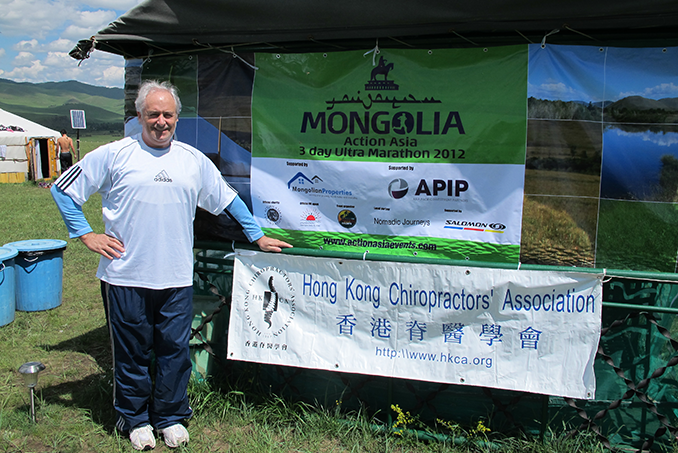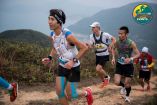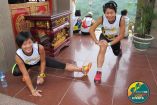THE GUT & IMMUNITY CONNECTION - PHYSIOLOGY IN ATHLETES - Part 1
Dr. David Cosman (Doctor of Chiropractic)
Dr. Benita Perch (Naturopathic Physician)
Distance runners commonly experience digestive problems including burning pain, sharp pains, and sudden desperation to find a “natural” toilet for diarrhea, as happens with “runner’s trots”. These problems can often be described and controlled.
Intense emotional and exercise stress results in the adrenal glands producing higher than normal secretions of a hormone called cortisol. Too much cortisol affects activity and integrity of the hugely important mucous lining in the respiratory tract, bladder, and yes, in the intestine. Changes in the protective lining and enzyme-secreting intestinal cells causes problematic digestive imbalance.
The mucous linings collectively contribute to the immune system, therefore, high cortisol also leads to immune suppression. This can explain why extreme athletes can have problems with upper respiratory tract infections and problems with their gut health. With shedding of mucous lining cells, stressed-out athletes can develop both “leaky gut syndrome” (where nutrient absorption is reduced), and food intolerances and intestinal disturbances such as casein (milk protein) intolerance.
With athletes, reducing exercise is not always an option; one therefore needs to restore nutrients in safe and effective fashion. Treatment and prevention can be offered with supplemental nutrients, enzymes, herbs, and homeopathy. Natural medicine is best taken on the recommendation of NDs – Doctors of Natural Medicine. Naturopathic Doctors are highly trained in assessment and diagnosis, and helping to bring the body into homeostasis or equilibrium; the key to physiological health. Taking advice from websites, friends health food store clerks, or from a magazine piece is a hit and miss system.
There are many considerations. Adaptogenic herbs (those that help body deal with stress) like rhodiola and gingseng are both immune modulating and help to regulate cortisol levels. N-acetyl glucosamine and glutamine help to rebuild the mucous lining. Probiotics are also useful for normalizing gut flora and rebuilding the lining. These are just a few. After testing for IgG food intolerances and removing these, the gut lining could heal more easily.
In a double-blind trial, supplementation with 10 g of glutamine after running a marathon or ultra-marathon, significantly decreased the incidence of infections over the next 7 days. One hundred fifty-one marathon and ultra-marathon runners received (in double-blind fashion) either 5 g of glutamine, or placebo in 330 ml of water immediately after the run and again 2 hours later (total glutamine dose was 10 g). In the 7 days following the event, infections occurred in significantly fewer individuals in the glutamine group compared to the placebo group (19.2% vs. 51.2%; p < 0.001).
Emotional stress-reducing considerations include occupational and relationship stress. Introducing meditation and breathing exercises can lower cortisol. Sufficient sleep (at least 8 hours a night) is very important for restoration.
The healthy physiology of the body requires a natural chemical equilibrium known as homeostasis, and experienced sports doctors will team up with NDs, using their special education and qualifications to address the complexity of how the stress of intense training and racing can throw the body out of balance.
Other useful nutrition notes for hikers and runners:
Bio-available (highly absorbing) magnesium and calcium are both known for reducing muscle cramping, but there is more to it than that. Magnesium is a cofactor for the synthesis of ATP, the body's main immediate fuel for cellular activities. Sweating may decrease tissue magnesium levels, and it is tough to get sufficient magnesium in a regular diet. Normalizing magnesium through supplementation lays claim to improved aerobic performance, greater strength, and less exercised-induced muscle injury.
Calcium loss through sweating can affect the buffer system, making the body too acidic. With low calcium, the body will balance itself by borrowing calcium from storage; yes, from your bones. Osteoporosis and kidney stones are then threats. Stones can develop from bone calcium (oxalate) released from “calcium storage” of the bones; this occurs when the body detects low calcium levels. Avoiding calcium in the diet is not the best way to prevent kidney stones! Unfortunately, calcium in food is commonly avoided because it is usually would come from vegetables reputed as gas producing. Supplements of calcium and magnesium are therefore quite valuable.
Many anti-inflammatory drugs can irritate the stomach, and can cause intestinal bleeding. Ask your doctor.
Concerning electrolytes, too much sodium can causes problems that are commonly confused with heat stroke. Sodium supplementation has its’ place, but it is commonly overdosed by many athletes who self-prescribe, thinking that extra doses of commercially available sodium-based electrolyte replacement products will increase performance.
Dr. David Cosman volunteers at Action Asia races and practices in Hong Kong
Providing: Chiropractic, Foot Orthotics, Massage Therapy, Sport Injury Care
Cosman Health Group Ltd.
DR. DAVID COSMAN
PLEASE NOTE OUR NEW CLINIC ADDRESS:
Dr. David Cosman
Cosman Health Group Ltd
chiropractic, sports injury therapy, foot orthotics
1st floor, 19-25 Jervois Street
Sheung Wan, Hong Kong
tel: (+852) 2975 4114
www.cosman.hk
info@cosman.hk







678.jpg)

/CBREMKC_9735_HK_Logo web banner-01.jpg)
/RoyalInt300100banner.jpg)
/HysanWebBannerDesign300.png)